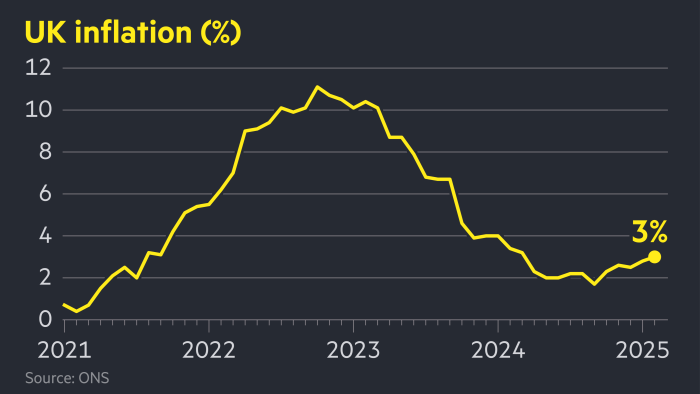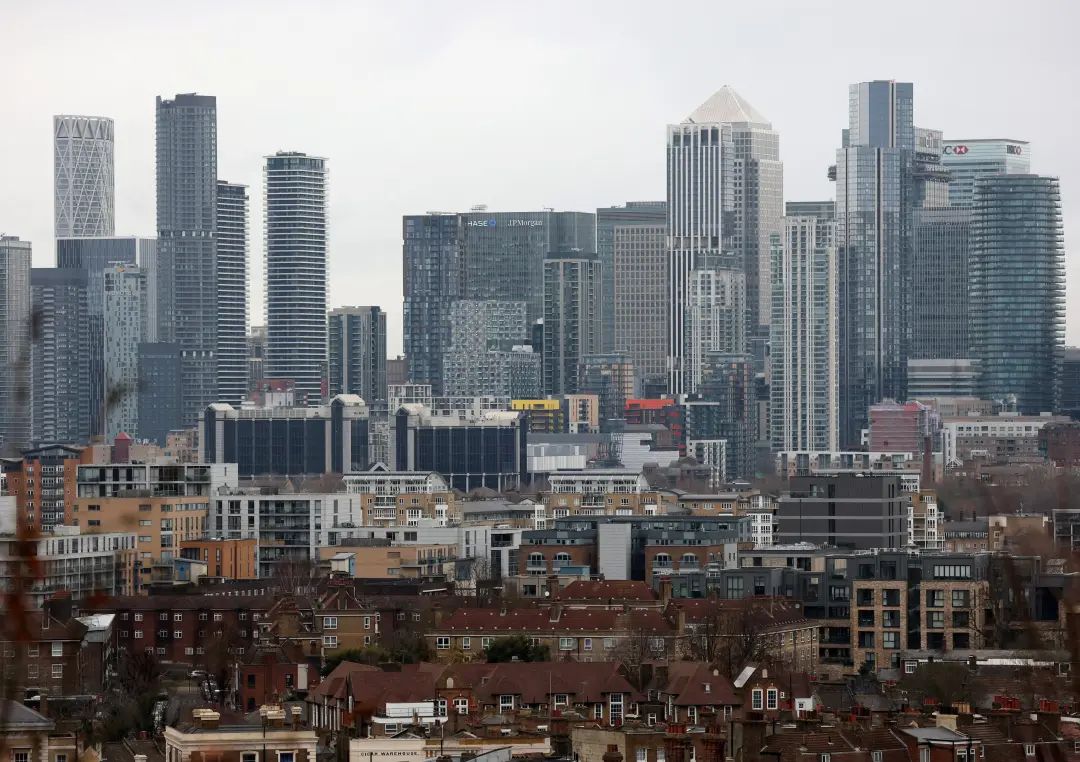1. UK inflation reaches 10-month high
Recently, the Office for National Statistics (ONS) disclosed the latest official data, which showed that in the year ending January 2025, the UK inflation rate jumped rapidly from 2.5% in December 2024 to 3%.The figure not only far exceeds economists' previous forecasts, but is also the highest in almost 10 months.

The ONS said this was due to higher prices for meat, bread and cereals driving up food bills, and private school fees rising due to the government's removal of VAT exemptions, pushing up the cost of education services.
Airfares fell in January, but not as much as usual, and this, combined with higher fuel costs, pushed annualised transport inflation to its highest since February 2023.

Following the release of the relevant data, the Bank of England forecast that inflation would climb to a peak of 3.7 per cent in the third quarter of this year, before gradually falling back.
Market traders predicted that the Bank of England would cut interest rates twice this year, each time by 25 basis points. However, they lowered the likelihood of a rate cut in March from 25 per cent to 15 per cent.
2. UK private rents rose by 8.7% last year
Private rents in the UK rose by an average of 8.7 per cent in the 12 months to January 2025, data from the Office for National Statistics shows .

Rent increases by region are shown below:
Average rents in England rose by 8.8 per cent to £1,375 per month;
Wales average rents rose by 8.4 per cent to £780 per month;
Scotland average rents rose by 6.2 per cent to £995 per month;
Northern Ireland has seen average rents rise by 8.3 per cent in the 12 months to November 2024
Of the English regions, London had the highest rent increase at 11.0 per cent, while Yorkshire and the Humber had the lowest increase at 5.3 per cent.
The main reason for the significant increase in rents is the imbalance between supply and demand in the rental market, with a shortage of rental properties and an increasing number of tenants. Due to legislative changes and financial pressures, many landlords are choosing to sell their properties or turn to the short-term rental market, which is further exacerbating the shortage.
Alex Upton, Managing Director of Hampshire Trust Bank, noted that the rental market remains under pressure, with demand continuing to outstrip supply, with multiple applicants vying for each property, and competition remains fierce despite the increase in availability. Until supply and demand are balanced, rents will continue to rise.
3. London house prices to stabilise in 2024
The latest data from the Office for National Statistics (ONS) shows that London house prices will remain stable in 2024, with an average house price of £549,000: while house prices in the rest of the UK will be in the red, up 4.6%, with the average house price climbing to £268,000.

London's stagnant house prices are largely the result of affordability pressures on home buyers, with Halifax data showing that London's house price to income ratio is a staggering 8.22, far higher than the national average of 6.55, meaning that it would take middle-income Londoners nearly 8.3 years of no money at all to buy a medium-priced home.
On the other hand, this also presents an opportunity for buyers: during a period of price stabilisation, buyers have more time to shop around without being held hostage to the pressures of rapidly rising prices, and are able to bargain with sellers in a more relaxed manner.

The UK economy as a whole is still on the road to recovery. With the passage of time, the economic situation is expected to lead to the improvement of residents' income, and the value of property, whether for self-occupation or investment, may be further highlighted.
4. Updated version of London's super-luxury property rental market
According to statistics published by Savills, there is now a ‘new class of super-luxury tenant’ in London, and unlike the traditional wealthy, they are younger.

In 2017, the average age of its super-rich tenants was around 55; in 2025, 73 per cent of super-rich tenants will be in the 30-50 age group, with 12 per cent in the 20-30 age group, representing a youthful trend. Young families are the main reason for this, flooding the rental market in search of housing in central London and near prestigious schools.
Meanwhile, there has been an increase in wealthy entrepreneurial tenants, with 60 per cent of recent super-prime tenants being ‘business founders’, and an increase in tenants in the finance or investment sectors. The number of North American tenants increased by 12 per cent year-on-year, accounting for around a third of the total, while the number of European tenants increased by 4 per cent over 2023, accounting for almost 20 per cent of the total.
According to Isabella Birch Reynardson, an executive at Savills, despite the headwinds, London remains the world's preferred city to live in due to its unique lifestyle, culture and educational resources. In addition, due to the high price of luxury property, ‘rent-and-buy’ is becoming popular, reflecting the increased flexibility of the London property market.
5. UK Layoffs to Continue in 2025
A survey of UK businesses has revealed a worrying trend. In the last three months of 2024, small business confidence in the UK fell to its lowest level in 10 years (excluding the new crown epidemic).

The Labour government's Autumn Budget policy of ‘increasing employers’ National Insurance contributions and raising the minimum wage’, which will come into effect in April 2025, has further increased the burden of staffing costs on businesses.
Over a third of the 2,000 UK companies surveyed plan to cope with rising costs by laying off staff or scaling back recruitment, and 42 per cent of those surveyed also said they would increase the price of their products or services to pass on cost pressures.

For large companies, according to the UK Guardian newspaper on 27 January 2025, the John Lewis Partnership, the parent company of the UK's upmarket department store chain John Lewis, is considering laying off up to 11,000 staff over the next five years, with at least 10% of staff at the group's headquarters, its supermarkets and department stores likely to be affected.
Buy a property in the UK with a team of professionals who know the UK property market best| Lansha Group
Founded in 2014 and headquartered in Paddington, London, Lansha Group has become one of the top 100 seafarers in the industry in the past 10 years, providing one-stop services for international property. We have many years of professional experience in dealing with all aspects of the property market, from choosing a property to opening a home, loans, solicitors, tenancy management and second-hand property sales. We provide 24-hour real-time service to our global clients, assisting them in dealing with the cumbersome formalities of property purchase and home inspection, so that they can move into their homes or invest in them with peace of mind. If you are looking to invest in the UK, Lansha Group has a professional investment team to assist you in selecting the best properties, analysing the housing information and regional development, and making a comprehensive assessment to choose the ideal home. Visit Lansha Group's website now to view our selection of properties and choose your dream home!
If you have any questions about buying a property in the UK, please feel free to contact us directly